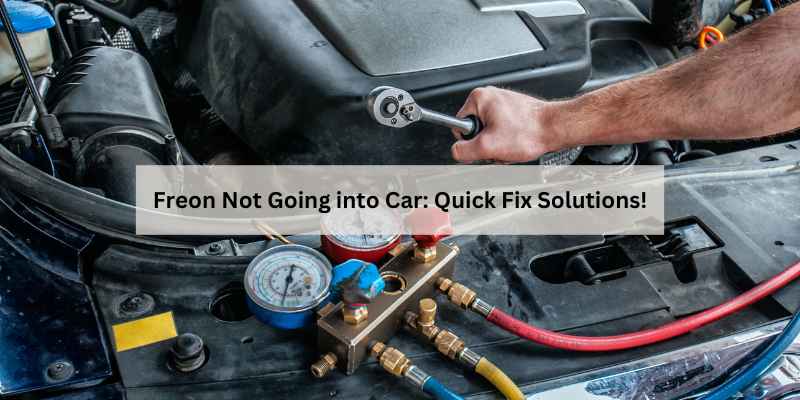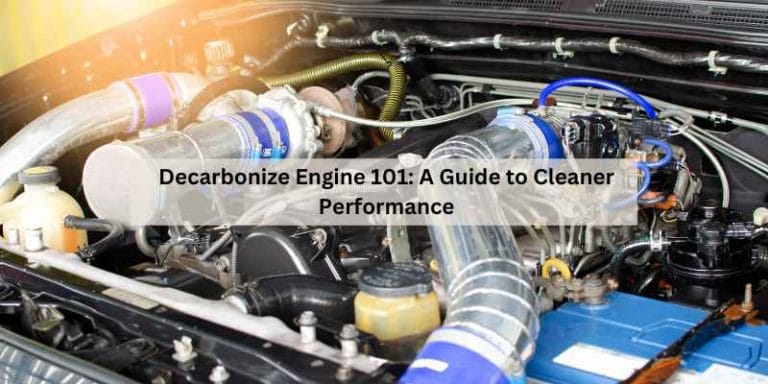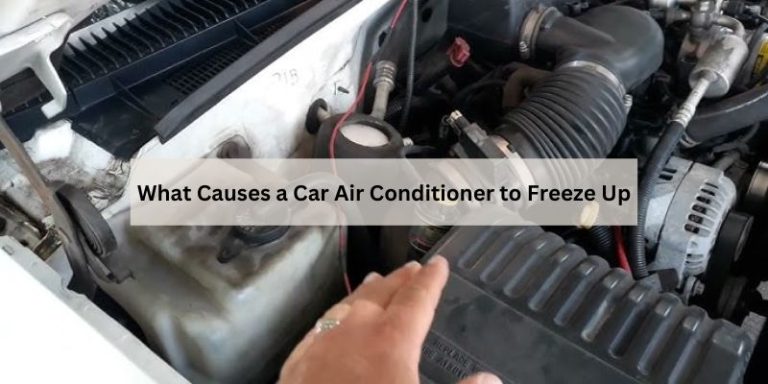Freon Not Going into Car: Quick Fix Solutions!
Freon may not enter your car due to low refrigerant levels or a malfunctioning AC system. Check for leaks or faulty components to diagnose the issue.
Air conditioning is essential for comfort during hot weather. A properly functioning AC system cools the cabin and improves driving experience. If your car’s Freon isn’t circulating, it can lead to warm air blowing from the vents. Understanding why Freon fails to enter the system helps in addressing the problem quickly.
Regular maintenance ensures that your AC runs efficiently. Common causes include leaks, compressor issues, or clogged filters. By identifying these issues early, you can avoid costly repairs and enjoy a comfortable ride. Make sure to consult a professional for a thorough inspection and effective solutions.
Introduction To Freon Issues In Cars
Low Freon levels can lead to several noticeable symptoms. The air conditioning may blow warm air instead of cool. Unusual noises from the AC system might occur. You may also see ice buildup on the AC components. These signs indicate a Freon issue that needs attention.
Freon plays a crucial role in vehicle cooling. It helps absorb heat from inside the car. This process keeps the cabin at a comfortable temperature. Without enough Freon, the cooling system cannot function properly. Regular checks can prevent major AC problems.
Common Reasons Freon Won’t Enter The System
Several reasons can cause Freon not to enter your car’s system. A blocked service port can stop the flow of refrigerant. Dirt or debris often causes this blockage. Check the port for any visible obstructions.
A faulty compressor may also prevent Freon from circulating. The compressor is vital for moving refrigerant through the system. If it doesn’t work, Freon can’t flow properly.
Another reason is leaks in the system. Even small leaks can let refrigerant escape. Regularly inspect hoses and connections for any signs of damage.
Safety First: Preparing To Handle Freon
Handling Freon safely is very important. The right safety gear protects you from harm. Always wear goggles to shield your eyes. Gloves are essential to keep your hands safe. A mask can help avoid inhaling fumes.
Check local regulations about Freon. Proper disposal is crucial to avoid harming the environment. Follow the rules to stay safe and legal. Training may be required for handling Freon. This helps ensure safety and compliance.
| Safety Gear | Purpose |
|---|---|
| Goggles | Protects eyes from chemicals |
| Gloves | Keeps hands safe from contact |
| Mask | Prevents inhaling harmful fumes |
Step-by-step Guide To Diagnosing The Issue
Start by checking the compressor. Ensure it is running when the AC is on. A faulty compressor may prevent Freon from entering the system.
Next, inspect the AC system for leaks. Look for oily spots or hissing sounds. Use a UV dye or a leak detector for a thorough check.
Finally, evaluate the service port. Make sure it is not clogged or damaged. A blocked service port can stop Freon from flowing properly.
Quick Fix Solutions
Start by checking the service port. A blocked port can prevent Freon from entering the system. Use a clean cloth to clear any dirt or debris. This simple step can help restore flow.
For temporary fixes of leaks, use a sealant product. These products can help reduce Freon loss until a proper repair is made. Remember, this is not a permanent solution.
Refilling Freon is necessary when the AC system is low on refrigerant. Check the pressure levels regularly. If they are low, consider adding more Freon. Always follow the manufacturer’s instructions for the best results.
Professional Intervention: When To Seek Help
Notice strange noises coming from the car? This might be a sign. Check for unusual smells too. These can indicate a problem with the air conditioning system.
Look for poor cooling performance. If the air isn’t cold, it’s time to act. Leaking refrigerant is another sign to watch for. A puddle under your car could mean trouble.
Finding a trusted mechanic is important. Ask friends for recommendations. Read online reviews to ensure quality service. A good mechanic will help solve the Freon issue quickly.
Preventive Measures To Avoid Future Issues
Keeping Freon levels in check is essential for car AC health. Regularly check the system for leaks. Look for signs like low cooling efficiency. Always follow the manufacturer’s maintenance schedule.
Consider these tips:
- Inspect hoses and connections for wear.
- Keep the AC system clean from debris.
- Change filters regularly to ensure airflow.
- Monitor the temperature settings and performance.
- Get a professional check-up at least once a year.
Freon monitoring can prevent bigger issues. Check levels every few months. This helps in maintaining optimal performance.
Conclusion: Maintaining A Cool Ride
Keeping your car’s air conditioning system in good shape is crucial. Regular checks can help prevent issues with Freon levels. Ensuring the compressor works properly is essential. Inspect hoses and connections for leaks regularly.
Maintaining refrigerant levels is important for efficiency. Replace worn-out parts promptly to avoid bigger problems. Cleaning the condenser can enhance performance and keep things cool.
| Solution | Description |
|---|---|
| Check for Leaks | Look for any signs of refrigerant leaks. |
| Inspect the Compressor | Ensure the compressor is functioning correctly. |
| Replace Worn Parts | Change parts that are old or damaged. |
| Clean the Condenser | Remove dirt and debris from the condenser. |
Frequently Asked Questions
Why Is My Car Not Accepting Freon?
Your car may not accept freon due to a leak in the system, a clogged filter, or faulty components like the compressor. Low refrigerant levels can also prevent proper charging. Check for these issues before recharging your AC system. Regular maintenance helps avoid these problems.
Can You Recharge Ac If The Compressor Won’t Engage?
Recharging the AC won’t work if the compressor won’t engage. First, check the power supply and fuses. Inspect the thermostat and any potential leaks. If issues persist, consult a professional technician to diagnose and repair the compressor. Avoid DIY fixes without proper knowledge.
Is It Ok To Run Car Ac When Low On Freon?
Running your car’s AC when low on Freon is not advisable. It can damage the compressor and lead to costly repairs. Always check Freon levels before using the AC. Regular maintenance ensures optimal performance and longevity of your vehicle’s cooling system.
How Do You Know If Your Car Ac Is Clogged?
Signs of a clogged car AC include weak airflow, unusual noises, and unpleasant odors. You might also notice inconsistent cooling or ice buildup on the evaporator. Regular maintenance can help prevent clogs and ensure efficient AC performance. Check filters and ducts for blockages to keep your system clear.
Conclusion
Freon not entering your car’s AC system can lead to uncomfortable drives. Identifying the cause is crucial for effective repairs. Regular maintenance can prevent these issues. Always consult a professional for diagnostics and solutions. Keep your vehicle cool and efficient by addressing Freon problems promptly.
Enjoy a comfortable ride year-round.







